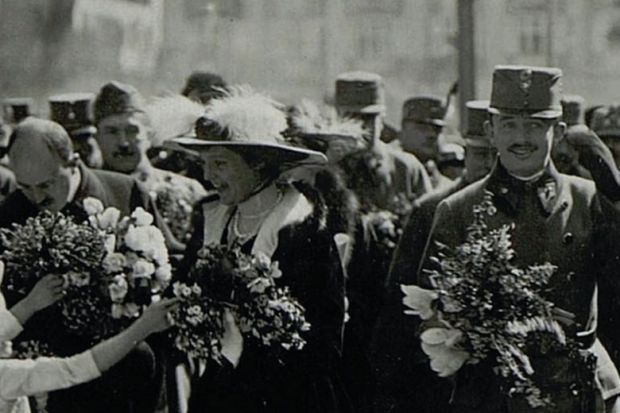TRANSITION OF THE CROATIAN ADMINISTRATIVE ELITE FROM THE HABSBURG MONARCHY TO THE YUGOSLAV STATE
At the end of the 19th and in the early 20th century an important part of the Croatian social elite were high-level administrative officials of the Land Government and members of its subsidiary offices, as well as leading officials in eight Croatian counties. The latter part of the elite inherited a kind of social exclusiveness which was based on the long tradition of Croatian feudal society and municipal laws. Acting within the scope of state and legal autonomy, the Land Government, as the supreme governing authority in Croatia and Slavonia, together with the counties, districts and urban municipalities, represented the most significant institutions empowered by numerous officialdom.
In this study we will primarily analyse the position of members of state administrative elite consisting of great county prefects, as well as certain heads of government departments, offices and institutes. As the highest professional officer of the county administration, the great county prefect is a confidant of the government, responsible for overseeing the entire administration and self-government in the county. For his work he reported to the Land Government in Zagreb. He was appointed on the proposal by Ban. In any case, the institution of the great county prefect provided equally the interest of the Viennese court, as well as the Hungarian ruling circles. While in the early 20th century most county prefects were conservative individuals associated with the ideology of the People’s Party (unionists), after the Croatian-Serbian coalition came to power some county prefects accepted the political ideas of the “new course”. The situation changes drastically during the First World War, and the formation of the Kingdom of Serbs, Croats and Slovenes was followed by the process of the abolition of counties. In this interregnum great county prefects were replaced by confidants of S. Pribićević with the task of conducting the centralization and unitarization of the state and the abolition of the Provincial Administration of Croatia and Slavonia in 1924.
The First World War and the Croatian accession to the new state union must have been a very traumatic experience for this elite. With the help of literature and archival sources, we will explore how the administrative elite handled this transition. The study should also provide an answer to the question of how the political situation affected the loyalty of great county prefects and other members of the state administrative elite towards the regime; who in the new state used his professional experience to hold a high position and whether national orientation was one of the criteria for the function; whether the new regime treated the members of the administrative elite of the former state as traitors and if therefore individuals had to flee abroad; which matters were dealt with by those who remained in the local environment, and the like. By applying the method of case studies we will analyse individual members of this group from different perspectives in order to arrive at lasting conclusions about the Croatian administrative elite in that period.
TRANZICIJA HRVATSKE UPRAVNO-ADMINISTRATIVNE ELITE IZ HABSBURŠKE MONARHIJE U JUGOSLAVENSKU DRŽAVU
Na kraju 19. i početkom 20. stoljeća važan dio hrvatske društvene elite činili su pripadnici visokog upravno-administrativnog činovništva Zemaljske vlade i njezinih pomoćnih ureda te vodeći činovnici u osam hrvatskih županija. Potonji dio elite baštinio je i svojevrsnu društvenu ekskluzivnost koja se temeljila na dugoj tradiciji hrvatskog staleškog društva i municipalnih prava. Djelujući unutar opsega državno-pravne autonomije Zemaljska vlada, kao vrhovna upravna vlast u Hrvatskoj i Slavoniji, zajedno sa županijama, kotarima i gradskim općinama, predstavljale su najznačajnije institucije iza kojih je stajalo brojno činovništvo.
U ovoj studiji analizirat će se prvenstveno položaj pripadnika upravno-administrativne elite koju čine veliki župani, ali i pojedini predstojnici vladinih odjela, ureda i zavoda. Kao najviši profesionalni činovnik županijske uprave, veliki župan je vladin pouzdanik, zadužen za nadzor cijele uprave i samouprave u županiji. Za svoj rad odgovarao je Zemaljskoj vladi u Zagrebu. Njega je na prijedlog bana imenovao vladar. U svakom slučaju, institucija velikog župana osiguravala je podjednako interes bečkog dvora, ali i mađarskih vladajućih krugova. Dok su početkom 20. stoljeća većina velikih župana konzervativni pojedinci, povezani s ideologijom Narodne stranke (unionisti), dolaskom na vlast Hrvatsko-srpske koalicije, pojedini župani prihvaćaju političke ideje „novoga kursa“. Situacija se drastično mijenja tijekom Prvog svjetskog rata, a nakon stvaranja Kraljevine SHS uslijedio je proces ukidanja županija. U tom interregnumu na mjesta velikih župana dolaze pouzdanici S. Pribićevića sa zadaćom provedbe centralizacije i unitarizacije države i ukidanja Pokrajinske uprave za Hrvatsku i Slavoniju 1924.
Prvi svjetski rat i ulazak Hrvatske u novu državnu zajednicu za ovu je elitu zacijelo bilo veoma traumatično iskustvo. Uz pomoć literature i arhivskih izvora, istražit će se kako se u toj tranziciji upravna elita snašla. Istraživanje bi također trebalo dati odgovor na pitanje kako su političke prilike utjecale na lojalnost velikih župana i drugih pripadnika upravno-administrativne elite spram režima; tko je u novoj državi iskoristio svoje profesionalno iskustvo kako bi obnašao visoku funkciju i je li pritom nacionalna orijentacija bila jedan od kriterija za funkciju; je li novi režim tretirao pripadnike upravne elite iz bivše države kao izdajnike i jesu li zbog toga pojedinci morali pobjeći u inozemstvo; kojim poslovima su se bavili oni koji su ostali u lokalnoj sredini i sl. Primjenom metode studije slučaja analizirat će se pojedini pripadnici ove skupine iz različitih perspektiva kako bi se došlo do trajnijih spoznaja o hrvatskoj upravnoj eliti u spomenutom razdoblju.
